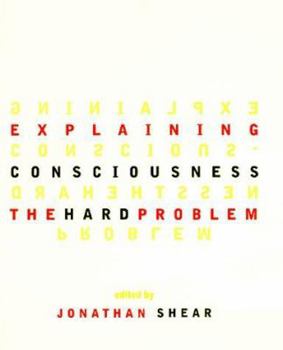Explaining Consciousness: The Hard Problem
Select Format
Select Condition 
Book Overview
At the 1994 landmark conference "Toward a Scientific Basis for Consciousness", philosopher David Chalmers distinguished between the "easy" problems and the "hard" problem of consciousness research. According to Chalmers, the easy problems are to explain cognitive functions such as discrimination, integration, and the control of behavi? the hard problem is to explain why these functions should be associated with phenomenal experience. Why doesnt all...
Format:Hardcover
Language:English
ISBN:0262193884
ISBN13:9780262193887
Release Date:June 1997
Publisher:Bradford Book
Length:430 Pages
Weight:2.60 lbs.
Dimensions:1.2" x 7.3" x 10.3"
Customer Reviews
4 ratings
Diverse and heaps of fun
Published by Thriftbooks.com User , 15 years ago
To get the most out of this book you probably want to read Chalmer's "The conscious Mind: In Search of a Fundamental Theory". That's the book which sparked this collection of essays. You will find a diverse and interesting bunch of opinions on the mystery of consciousness in this collection. At least one of the views should appeal to you whatever your own preference and there is much food for thought, A classic addition to any serious philosophers shelf.
A great introduction, a great collection, BUY IT!
Published by Thriftbooks.com User , 17 years ago
This collection begins with an essay by David Chalmers defending the view that no reductive, materialistic account of consciousness can ever be successful. The rest of the book is made up of over two dozen responses to Chalmers's essay--some supportive, some critical, and some derisive. These responses are written by some of the biggest names in the field, and are followed by a concluding essay, again by Chalmers, in which he tries to defend his own views against what has gone before. Because of the variety of viewpoints (materialism, dualism, mysterianism) and approaches (neurophysiology, analytical philosophy, quantum mechanics), this collection provides a wonderful introduction to some of the most important aspects of recent work in consciounsess studies. Just check out the table of contents. As a reductionist myself, I found Patricia Churchland's argument particularly hard to counter, and I think that anyone, regardless of their perspective, will find food for thought in Mark C. Price's wonderful piece. All in all, the best introduction I have ever encountered to the philosophical study of consciousness.
Excellent Overview of the "Hard" Problem of Consciousness
Published by Thriftbooks.com User , 19 years ago
Daniel Dennett's physicalist model of the mind (having its basis in Artificial Intelligence, Robotics and Neural Networks) claims to explain everything about the working of the mind. Can everything mental be explained by this model? i.e, can all mental properties be reduced to the four entities that constitute the physical: (1) Mass (2) Space (3) Time (4) Electric Charge ? Not everything has been explained by this model, sayeth David Chalmers. In a famous paper published in the Journal of Consciousness Studies in 1995, Chalmers argued that the "Hard" problem of consciousness remains untouched by physicalist models of the mind -- "Why does the performance of [brain] functions result in experience?" In other words, why do experiences such as the "sweetness of sugar", or "smell of mothballs", or "blueness of the sky" arise out of the firing of neurons? Why should "experience" arise out of a physical system at all? Chalmers got 26 responses for his paper, and he even responded to all the responses in a subsequent paper. This book contains all these papers on the subject. The "Hard" problem of consciousness has been around for a long time. Frank Jackson, Sydney Shoemaker, Joseph Levine have all pointed this out before, and Chalmers has merely highlighted the problem. But he has done a pretty good job of it, for even Daniel Dennett is having a "hard" problem being able to sleep nowadays! I dropped a star because Chalmers' idea of including "experience" as a fundamental entity is not covered well or convincingly.
Head Wars
Published by Thriftbooks.com User , 23 years ago
This book was just about my first taste of the consciousness wars. Or no. I’ve been reading about consciousness for about ten years. But it made too much sense to me. My retinas see you, my visual cortex sees my retinas, but who sees my visual cortex? Where does the buck stop? Because the buck does stop. Once it hit me that vision is vision, something you wouldn’t expect from a brain of mere structure and function, electrons moving around, drugs being administered, I embraced magic, and demanded that we are souls, things beyond law. A point-of-view can be such an amazing thing to have that I can even slip into the thought, ‘Only one POV can exist, they’re so unbelievable.’ But as Smith said, ‘There’s no such thing as a leaf, there are only leaves.’ This book is a delightful bunch of mental flowerings. David Chalmers is the nuclear furnace sun around which the rest of these characters orbit. Although it can seem like some are in different galaxies altogether. His explanation is ‘Information is phenomenal.’ He deftly eludes every attack the others come up with, although this book is not the final round. He admits that his theory is probably wrong, but says this type of speculation is just what we need. My problem is, ‘Info is phenomenal, but where does the subject come from, you need a subject for anything phenomenal to be noticed.’ (...)Chalmers is a true scholar and looks like he reads everything written about the subject. If you can’t afford the book, there are hundreds of online papers he’s collected. My final line to you is ‘The war is not just in your head.’





